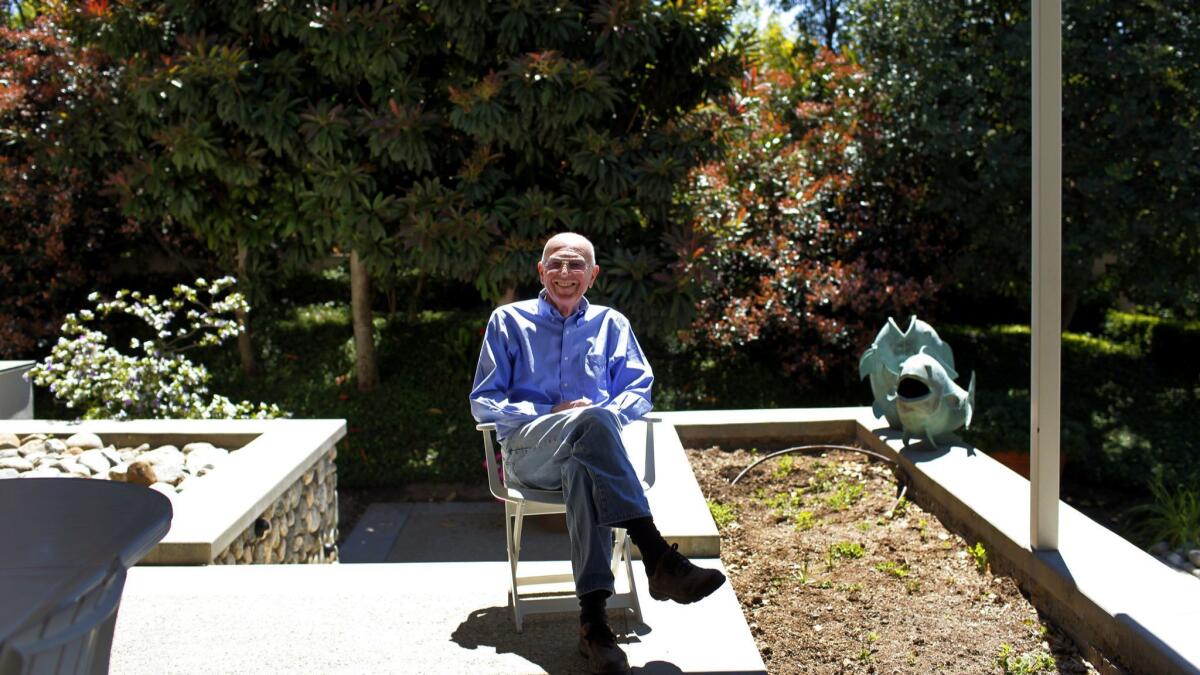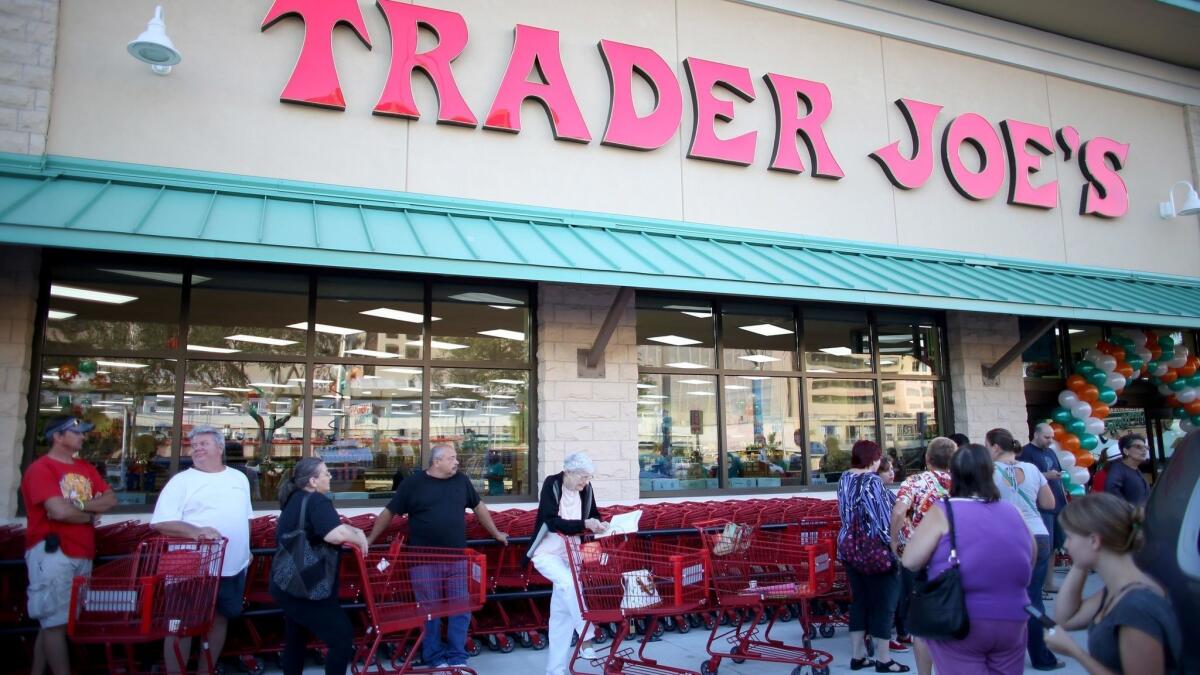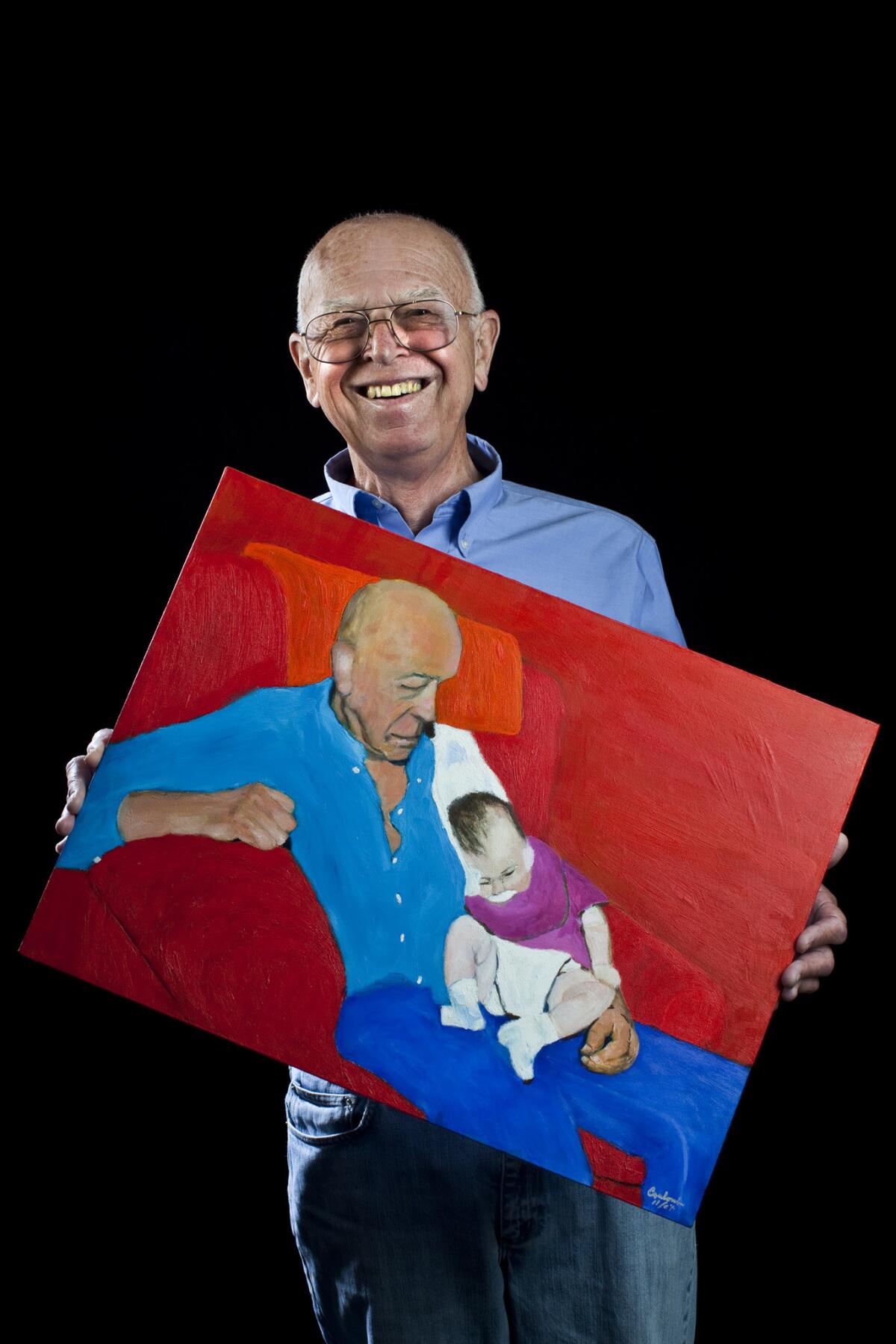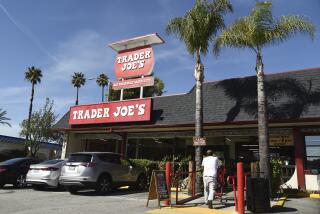Joe Coulombe, founder of Trader Joe’s, dies at 89

- Share via
He was a marketing whiz, a retail visionary whose chain of budget-minded specialty food stores, launched in the late 1960s with a distinctive South Seas trading post motif, developed a cult-like following on its way to becoming a Southern California institution.
Joe Coulombe, the founder of Trader Joe’s, died Friday after a long illness, said his son Joe. He was 89.
Trader Joe’s, which came to be known for everything from its inexpensive Charles Shaw (“Two Buck Chuck”) wine to its use of maritime bells for in-store communication, was a quirky local retail success before spreading beyond California in the 1990s after Coulombe left the company.
Coulombe was the owner of a small chain of 18 Pronto Market convenience stores in the mid-1960s when he became concerned about a growing competitive threat: the expansion of Dallas-based Southland Corp.’s 7-Eleven convenience stores into Southern California.
To survive, Coulombe knew he had to do something different.
The answer came in part from reading a story in Scientific American that said 60% of all people qualified to go to college were doing so, compared to only 2% in the Depression year of 1932.
Coulombe also read a newspaper article that said that wide-bodied Boeing 747 jumbo jets would be put into service in a few years, which would significantly reduce the cost of overseas air travel.
His conclusion: Target well-educated, well-traveled — but less-than-affluent — consumers who have more sophisticated and diverse tastes in food and drink.
With the South Seas becoming more accessible, Coulombe adopted the relaxed trading post theme for his stores, which he stocked with a global cross-section of offerings.
“He put a great deal of thought into it,” his son said. “He got an early take on the emerging trends — from the ecological movement to the raising education level.”
The first Trader Joe’s opened in 1967 on South Arroyo Parkway in Pasadena, with the store decorated with fish nets, oars, pennants and other nautical trappings. The inaugural store remains in business.

The Hawaiian-shirt wearing employees added to the trading post concept, with the manager dubbed “the captain,” the assistant manager “the first mate” and the staff “crew members.” Promotions were always from within the ranks.
Trader Joe’s became known as the place to buy reasonably priced food items such as nectarines from Chile, noodles from Thailand and whole bean coffee from El Salvador.
With research showing that the more educated people were, the more high-quality alcohol they drank, Coulombe stocked his stores with 100 brands of scotch, 50 brands of whiskey, 20 brands of brandy and 17 types of California wines. Even the ever-so-cheap Charles Shaw wine came with not only the date it was bottled, but an exact hour so fussy shoppers could restock with exactly the same pressing.
“I have an ideal audience in mind,” he told The Times in 1981. “This is a person who got a Fulbright scholarship, went to Europe for a couple of years and developed a taste for something other than Velveeta by way of cheese, something more than ordinary beer by way of alcoholic beverages and something other than Folgers by way of coffee.”
Coulombe often described his target customers as “the overeducated and the underpaid.”
“What that originally meant was, everyone from underpaid musicians to out-of-work PhDs could come to Trader Joe’s and find elements of the lifestyle they aspired to for not too much money,” he told Supermarket News in 2010, the year he earned a place in that publication’s Hall of Fame.
Customers, Coulombe said, “wouldn’t find branded items, but the merchandise was always of the highest quality and priced within the reality of a schoolteacher’s salary that offered glimpses into a much more affluent lifestyle.”
Part of the appeal in shopping at Trader Joe’s is never knowing what new items have been added and what items will no longer be available.
“I learned that lesson with vintage wines,” Coulombe explained in a 2011 Times interview. “There’s only so much 1966 Lafite Rothschild. So we deliberately pursued a policy of discontinuity, as opposed to, say, Coca-Cola, which is in infinite supply.
“For example, we had the only vintage-dated, field-specific canned corn in existence, and it was the best damned canned corn there was. But there was only so much produced every year, and when you’re out, you’re out.”

Coulombe was known for having a sense of what customers want — and for spotting trends.
“In 1971, health food became a very big thing,” Coulombe said in a 1988 Times interview. “A few years ago, frozen seafood became big. We try to stay right out in front.”
Trader Joe’s relaxed and friendly atmosphere has a lot to do with its employees.
Unlike other retailers who save money by paying lower wages, Coulombe attracted and retained the kind of workers he was looking for by paying the average full-time employee the median California family income and offering full benefits.
“He loved and believed in his employees and he wanted to keep them,” said his son. “And the only way to do that was to pay them well.”
In a 2014 interview with The Times, Coulombe said the typical tenure at Trader Joe’s was 35 years.
“I call them the roach motels: They check in and they don’t check out,” Coulombe said of longtime employees. “Some of the people I hired in the 1960s [are] finally retiring.”
With no money to launch a major advertising campaign when he started Trader Joe’s, Coulombe created “The Insider Report,” a customer newsletter that provided product information and which Coulombe described as “a marriage of Consumer Reports and Mad magazine.” In the 1980s, it became known as the “Fearless Flyer,” a chatty rundown on new, seasonal and offbeat offerings at the stores.
Beginning in 1976, Coulombe used radio to help raise the chain’s profile. He wound up doing more than 3,000 one-minute broadcasts on KFAC, a Los Angeles classical music station, in which he’d discuss food and wine. He closed each broadcast with “This is Joe Coulombe of Trader’s Joe’s.”
In 1979, Coulombe and his employees, who had a 45% ownership stake in the company, sold Trader Joe’s to a family trust established by Theo Albrecht, co-founder of the Germany-based discount supermarket chain Aldi.
Coulombe, however, continued to serve as chief executive until 1989.
Trader Joe’s unconventional approach to grocery shopping was part of the chain’s appeal, retail industry analysts told The Times in 1988 after Coulombe announced his plans to leave.
“It has a very distinct personality,” Ron Rotter, a retail industry analyst at Morgan, Olmstead, Kennedy & Gardner, said at the time. “It has a cult of customers who love going there to see what new wines have arrived.”
In 2000, Los Angeles magazine included Coulombe in its list of 10 influential Angelenos who have “quietly shaped whole tracts of high and low culture” over the last 40 years.
By mid-2011, the privately held Trader Joe’s had grown to more than 474 stores in 43 states and Washington, D.C. It was also facing more direct competition from chains like Whole Foods and Sprouts.
“My successors at Trader Joe’s have taken a 30-store chain nationwide with remarkable adherence to the basic concepts we started out with,” Coulombe said in the 2010 Supermarket News interview. “Though it’s certainly a different store than I left in 1989, I changed it so many times, I can’t argue with what they’ve done.”
Born in San Diego on June 3, 1930, Coulombe graduated from San Diego High School in 1947 and went off to Stanford University. With a year off for active duty in the Air Force, he graduated in 1952 and entered Stanford’s business school.
After earning his MBA in 1954, he landed a job as a researcher for the Owl-Rexall drugstore chain. In 1958, he was asked to launch Pronto Markets as a test in Los Angeles.
He was operating six of the markets by 1962 when Rexall told him to liquidate them. Instead, he found financing and bought the stores. He soon expanded the chain to 18 stores.
After leaving Trader Joe’s in 1989, Coulombe stayed involved in the retail industry.
In 1992, after working first as an independent business consultant, he became executive vice president for retailing and co-chairman of Pacific Enterprises’ Thrifty Corp. retailing unit. He oversaw the Thrifty Drug Stores chain in addition to Thrifty’s Big Five sporting goods chain and four other chains.
In the 1990s, he had a number of other corporate stints, including serving as president of Petrini’s, a supermarket chain; chief executive officer of Provigo Corp., a wholesale and retail grocer; and president and chief executive officer of Sport Chalet Inc., a sporting goods retailer.
Coulombe more recently served on the boards of Cost Plus World Market and True Religion Apparel.
In addition to his son, Coulombe is survived by his wife, Alice, daughters Charlotte and Madeleine and six grandchildren.
McLellan is a former Times staff writer.
Staff writer Steve Marble contributed to this report.
More to Read
Start your day right
Sign up for Essential California for the L.A. Times biggest news, features and recommendations in your inbox six days a week.
You may occasionally receive promotional content from the Los Angeles Times.






